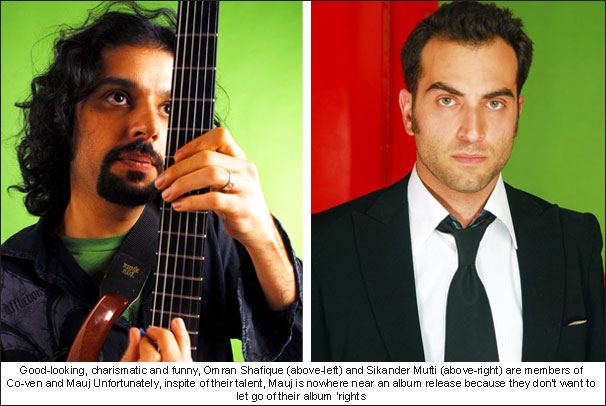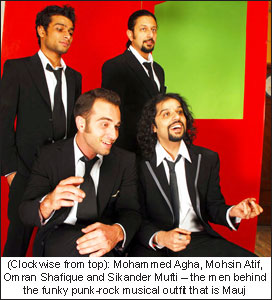|
|
| |
band
identity
Punk, rock and fun!
The essence of Mauj
With their
very first song, 'Khushfehmi', Mauj made a mark. But soon they
disappeared. After three years, Mauj are back with a fantastic
new song, 'Paheliyan' and this time, they are here to stay! Instep
takes an inside look at Mauj via Omran Shafique and Sikander Mufti…
Meet Mauj
|
| |
 |
| |
|
In a checkered collared
shirt and classic denims, Omran Shafique sits comfortably next to
Sikander Mufti, who looks like an athlete with his well-built physique
and a crew cut. Both the guys are having lunch with one eye on their
plate and the other taking in the animals running wild on National
Geographic.
The venue is Ali Azmat's open and notorious bachelor pad where the
guys crash on and off. "The music industry is so small yaar,
we're friends," Ali answers the quizzical look passed at him.
Other than being a friend, Omran Shafique is also the latest addition
to Ali Azmat's live and studio setup. He's playing on Ali's next
album, which insiders say is sounding pretty darn good. With the
funk that is Omran Shafique's signature and Ali's well known love
for the Red Hot Chilli Peppers, perhaps it was inevitable that they
would collaborate.
Soon, Ali disappears behind the walls of his room, leaving Omran
and Sikander out. After all, this interview is about Mauj.
|
| |
Mufti
lights a cigarette, stretches on the sofa and looks to Omran, who
roguishly says, "So, what's up?"
With his black dreadlocks falling slyly onto his face, a playful smile
and a friendly male charisma, Omran Shafique is the new face of punk-rock
music. For the uninformed, he is the front man of Mauj – the
band behind the hit punk rock number, 'Khushfehmi' that first released
in the summer of 2004. With a grabbing melody, laced with a punk sound
– there was no straight-up guitar slashing on the track - with
a bizarre yet funny wordplay as the song goes, "Baykhabri sey
aise chali/Chalti ho badalon mein kahin/ Woh samajhey khud ko kitna
haseen/ Magar afsoos woh janay nahie..." and a simple yet effective
video, 'Khushfehmi' made its mark. But the band disappeared just as
quickly as they had come.
And
now, three years later, Mauj is back with a slightly different line-up
but the same element of fun and punk with their new number 'Paheliyan'.
|
 |
| |
|
The beginning
It was 2000 when Mauj found its first footsteps, in empty spaces
and garages, where two men – Omran Shafique and Mohsin Atif
– started jamming together, discussing ideas and concepts.
"It was me and Atif back in the days in Houston. We had day
jobs. It wasn't serious but a 'loose' musical project," says
Omran reminiscing to the past. Two guys turned to four when Mohammed
Agha and Shuja Yasin joined in on guitars and drums respectively.
"The idea was to do music with a punk feeling to it with some
strange lyrics," laughs Omran.
True to their word, Mauj's first single, 'Khushfehmi' is punkish
and lyrically, somewhat strange. The single was released via internet
and created a stir in the local scene. "I came here and I heard
that people liked it so we teamed up with Babar Shaikh in 2004 and
the 'Khushfehmi video' was made," says Omran stroking his chin.
"I saw it on TV and I really, really liked it," chips
in Sikander Mufti, who is lying cozily on a sofa with a cigarette
burning at his fingertips. He lets Omran do the talking about Mauj.
It is, after all, his brainchild, just like Co-Ven is the proud
achievement of Sikander Mufti, who has almost always been around
in the various stages of metamorphosis Co-Ven has undergone.
Over the years, Mauj went through a crux of musicians and from the
sound of it, one can't believe that the songs of Mauj (clips of
other songs are available on their website www.maujonline.com) have
been recorded and produced in a garage in Houston.
"Taha Malik, whose forte is electronic music more than anything
produced and roughly mixed our material. In the later days, we brought
in Harvey Dennis – who was with me in our college band Drench
– to play on drums. Due to some problems with time and date,
it was Dennis who played on some numbers," says Omran of the
line-up.
In entity, Mauj is a band that began in the United States but for
it to work in Pakistan, the band had to move here. When Salman Ahmed
picked up his bag and moved to New York, it was a breaking point
for Junoon. Ultimately, what makes any band work are the constant
jam sessions. Omran understands this reality very well and hence,
decided to move to Pakistan.
"I moved here but to expect everyone, Dennis, Atif and the
others to come here is unfair." And like a savvy, smart musician,
Omran did so with a contingency plan. "Sikander is a part of
Mauj. I want all Co-Ven guys to be Mauj but the logistics need to
be worked out. Sameer is the bass player for Mekaal Hasan Band so
one has to be sure that no problems arise at the time of concerts,"
says Omran logically.
The plight of
music
Unlike many rock musicians, neither Omran nor Mufti are brooding
in their sense of self-importance and more importantly, they are
realistic musicians, even as they have ideals that define their
music, and by proxy, them. Differentiating between Mufti and Omran
would be a difficult task. Perhaps, the only real difference is
their sense of skepticism and optimism. Mufti is disillusioned with
the lack of structure that plagues our music industry. Omran is
slightly more optimistic, but he too has his share of doubts.
"Do you know that when one goes to the Passport office (NADRA),
they laugh or guffaw when you say you're a musician?" asks
Omran grimly. I nod, knowing fully well that in Pakistan, even as
the scene has grown tremendously, it is still not accepted by most
as a proper career in the society.
"You know, we're not worried about Mauj. Inshallah it will
do well," says Sikander thoughtfully. After a long hard drag,
he says, "Co-Ven is destined for more. I know it is. Pakistan
is not the final stop," he says of the band that has fought
hard in the face of adversity.
Coming back to Mauj, they made a great comeback this year! Come
2007 and Mauj were out with 'Paheliyan' and this time, Sikander
Mufti was in the video with Omran. With a vibrant video shot in
a barbershop and four men in black, it instantly got noticed and
is currently amongst the most-showed videos on all music channels.
The next step is concerts for a band like Mauj.
The one factor that keeps a musician alive, often, even without
a proper album release is live concert. Having seen Co-Ven live
a number of times and if they are anything to go by, Mauj will be
just as brilliant, perhaps even more so because of their catchy,
punk riffs that make one want to move. Having said that, concerts
in Pakistan all look the same. Unlike the West, where a proper stage
is put up with lights playing to effect, here, it is the same traffic
signal.
"As creative individuals who enjoy doing something different
and new, we would love to put up a show that is interesting,"
says Omran. "What ends up happening, we have to pull every
resource just to get a decent PA system so the possibility of even
finding the right people to put up a show with visuals attached
seems impossible," he says skeptically.
Sikander adds, "I've always wanted to design show. I have so
many ideas about light design, stage design and so forth. But here
you have a show to play, you also have to see security and the 'know-how'
is missing from the scene completely. For instance, on one song,
let's say I want dominantly red lights and at some point, I want
a blue affect on stage, who should I say this to? Ek Billo hai,
uss ko main kya samjhao? Main bolo red to woh kahey, 'sir mein to
sari lightein chalaonga'. More importantly, once you design a show,
you set a standard. Like on one tour, you use a certain stage design
like it's done in the West."
One may say that why don't they do it then if they have the ideas.
But like everything else, without the right people, proper funding
and a structure, new bands like Mauj and even Co-Ven have no leg
to stand on. It is this reason that many bank on endorsements for
big-budget videos. Others tour, sometimes rigourously and continuously
for years after an album is released because it is the ONLY way
to survive.
Looking at the bigger picture, it is clear that Pakistani masses
look for entertainment in music. It is this entertainment factor
(of beats) that makes Ali Zafar and Atif Aslam, the superstars of
music. The masses want music they can dance to or "cry to,"
according to Sikander who knows fully well the taste of the Pakistani
audience. But this fact doesn't disillusion him or Omran. They both
agree that even Co-Ven has a market, even if it is smaller and Mauj
is gaining strength with every passing day.
One would think that a band like Mauj is ready to release its album,
especially if an all English-language music outfit like Co-Ven has
managed to do so. But then again, it is not about a deal but about
the 'rights'. "If you were to ask me to write down on a piece
of paper what a record label in Pakistan does for an artist, I would
give you a blank page," says Sikander sadly.
"Tell me, what does a record label in Pakistan do for a musician?"
asks Omran and the answer is nothing really other than distribution.
"You make a song, video, you record an album in a studio. You
get your butt to concerts. You do it for free and the record label
owns you," says Ali Azmat as he walks by.
Mauj is finished with its album, most of it anyway but they have
not signed a deal with any record label because they don't want
to lose the rights to their own songs. "This guy (point to
Omran) hasn't sold off his rights because he gets tution from moi,"
laughs Ali Azmat.
"The rights to our own songs should belong to us. There is
no other way to do it," says Omran passionately.
It remains unclear exactly when Mauj will see a commercial release
but with their talent and passion, Mauj will continue to make waves,
come hell or high water.
–Photos
by Tapu Javeri
|
| |
|

